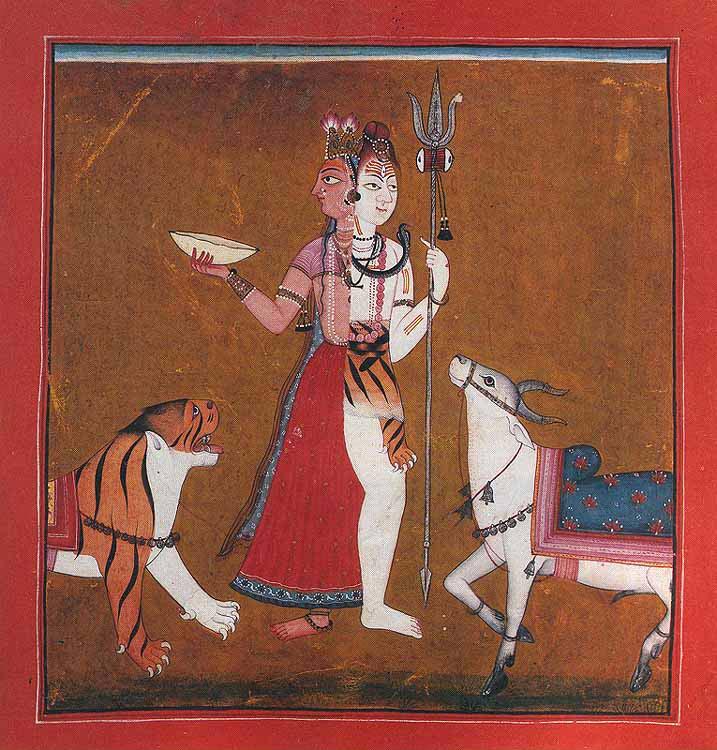जय भगवति देवि नमो वरदे जय पापविनाशिनि बहुफलदे ।
जय शुम्भनिशुम्भ कपालधरे प्रणमामि तु देवि नरार्तिहरे ॥ १ ॥
jaya bhagavati devi namo varade jaya pāpavināśini bahuphalade ।
jaya śumbha-niśumbha kapāladhare praṇamāmi tu devi narārtihare ॥ 1 ॥
Victory to you, divine goddess! Salutations to the granter of boons. Victory to the destroyer of wickedness and the giver of myriad fruits. Victory to the one who took the heads of the demons Śumbha and Niśumbha. I prostrate before you, O goddess, who destroys the suffering of humankind.
जय चन्द्रदिवाकरनेत्रधरे जय पावकभूषितवक्त्रवरे ।
जय भैरवदेहनिलीनपरे जय अन्धकदैत्यविशोषकरे ॥ २ ॥
jaya candradivākaranetradhare jaya pāvakabhūṣitavaktravare ।
jaya bhairavadehanilīnapare jaya andhakadaityaviśoṣakare ॥ 2 ॥
Victory to you, who wears the moon and the sun as her eyes. Victory to you, whose beautiful face is adorned with the glow of Lord Agni’s fire. Victory to you, who merged your body with that of Bhairava (Lord Śiva) to become the Supreme (Ardhanārīśvara)1. Victory to you who dried up the demon Andhaka’s power2.
जय महिषविमर्दिनिशूलकरे जय लोकसमस्तकपापहरे ।
जय देवि पितामहविष्णुनुते जय भास्करशक्रशिराऽवनते ॥ ३ ॥
jaya mahiṣavimardiniśūlakare jaya lokasamastakapāpahare ।
jaya devi pitāmahaviṣṇunute jaya bhāskaraśakraśirā'vanate ॥ 3 ॥
Victory to you, who crushed the demon mahiṣa and killed him with your spear. Victory to you, who destroys wickedness in all worlds. Victory to you, O goddess, who is worshipped by Pitāmaha (Brahmā) and Viṣṇu. Victory to you, before whom the sun and all other devas prostrate.
जय षण्मुखसायुध ईशनुते जय सागरगामिनि शम्भुनुते ।
जय दुःखदरिद्रविनाशकरे जय पुत्रकलत्रविवृद्धिकरे ॥ ४ ॥
jaya ṣaṇmukhasāyudha īśanute jaya sāgaragāmini śambhunute ।
jaya duḥkhadaridravināśakare jaya putrakalatravivṛddhikare ॥ 4 ॥
Victory to you who is worshipped by the six-faced and many-armed Lord Kārttikeya. Victory to you, who is worshipped by Lord Śiva as you flow towards the ocean (as the river Gaṅgā). Victory to you, who annihilates pain, sorrow, and poverty. Victory to you, who increases prosperity by providing children and spouses.
जय देवि समस्तशरीरधरे जय नाकविदर्शिनि दुःखहरे ।
जय व्याधिविनाशिनि मोक्षकरे जय वाञ्छितदायिनि सिद्धिकरे ॥ ५ ॥
jaya devi samastaśarīradhare jaya nākavidarśini duḥkhahare ।
jaya vyādhivināśini mokṣakare jaya vāñchitadāyini siddhikare ॥ 5 ॥
Victory to you, O goddess, who is the spirit moving within all living beings. Victory to you, who reveals the heavenly realms and removes pain and sorrow. Victory to you, who destroys disease and bestows liberation. Victory to you, who fulfills desires and grants spiritual powers3.
एतद्व्यासकृतं स्तोत्रं यः पठेन्नियतः शुचिः ।
गृहे वा शुद्धभावेन प्रीता भगवती सदा ॥ ६ ॥
etadvyāsakṛtaṃ stotraṃ yaḥ paṭhenniyataḥ śuciḥ ।
gṛhe vā śuddhabhāvena prītā bhagavatī sadā ॥ 6 ॥
Whoever diligently and sincerely recites this hymn composed by Veda Vyāsa, either in their home or anywhere with pure-mindedness, will eternally delight the divine goddess.
॥ इति व्यासकृतं भगवतीस्तोत्रं सम्पूर्णम् ॥
॥ iti vyāsakṛtaṃ bhagavatīstotraṃ sampūrṇam ॥
Thus the Hymn to the Divine Goddess composed by Veda Vyāsa is completed.
-
 Ardhanārīśvara is an androgynous amalgam of Lord Śiva and his consort Pārvatī Devī, typically depicted as half female and half male. ↩
Ardhanārīśvara is an androgynous amalgam of Lord Śiva and his consort Pārvatī Devī, typically depicted as half female and half male. ↩
-
There are several different versions of the story of the demon Andhaka. In one, he is the son of Śiva and Parvatī. He was formed when Parvatī covered Śiva’s eyes with her hand, and the heat from his gaze caused her palm to sweat. A drop of sweat fell from her hand to the earth, and from it a child was appeared. The child was blind, so they named it Andhaka. The demon king Hiranyākṣa had done penance to Lord Śiva in order to get a son, so Śiva gave Andhaka to Hiranyākṣa. Even though he was born as a child of Śiva and Pārvatī, he was raised as a demon and enemy of the devas who is ultimately defeated by Śiva.
In another version, Andhaka is the natural born son of Hiranyākṣa and a very powerful demon. He heard that Pārvatī was the most beautiful woman in the world, and tried to abduct her. In the ensuing battle, he was defeated by Śiva.
In yet another version, Andhaka is the son of Diti and the sage Kaśyapa (as a son of Diti he was a daitya, a particular class of demon). Diti asked Kaśyapa for a son who could not be killed, even by the gods. Kaśyapa granted this request with the caveat that the child could still be killed by Śiva, as Kaśyapa had no power to prevent Śiva anything. Andhaka used this near immortality to terrorize the whole of creation. Eventually his hubris led him to challenge Lord Śiva, resulting in his demise.
In all these different versions of the story, Andhaka is ultimately defeated by Lord Śiva. He is sometimes killed, and sometimes redeemed and made a member of Śiva’s retinue.
In some of these stories, there is an incident wherein anytime Andhaka is wounded, each drop of his blood that touches the ground spawns another powerful demon. In order to combat this, Śiva calls upon Devī to consume the blood before it touches the ground. I believe this is what is referenced in this verse as how Devī “dried up” Andhaka’s power. ↩
-
A siddha is a spiritually perfected being. They are endowed with eight spiritual powers (aṣṭasiddhi): aṇiman (able to become as small as an atom), mahiman (able to become as large as the whole universe), gariman (able to become infinitely heavy), laghiman (able to become weightless), prāpti (able to obtain anything at will), prākāmya (able to assume any form), īśitva (power over life and death), and vaśitva (able to impose one’s will on any living being). ↩

